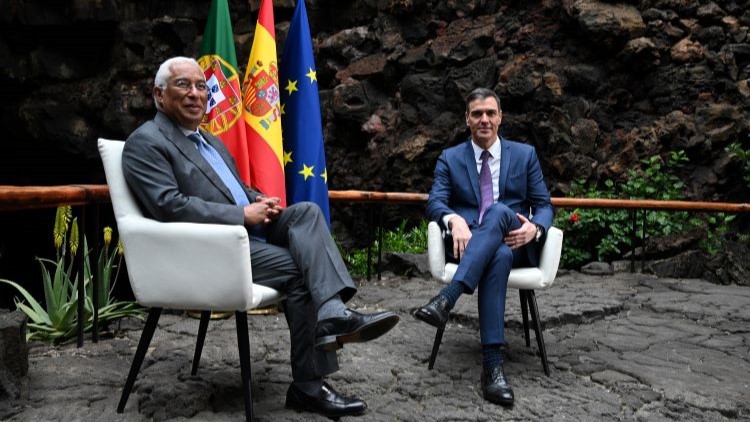Eduardo González
Domestic political issues and international financial tensions hovered yesterday during the XXXIV Spanish-Portuguese Summit, which was held in Lanzarote and in which the President of the Government, Pedro Sánchez, and the Portuguese Prime Minister, António Costa, showed their “harmony” regarding the priorities of the upcoming Spanish Presidency of the Council of the European Union, such as the Pact on Migration and Asylum, the new fiscal rules, the defense of a regulatory framework for the electricity market, the “open strategic autonomy” and the strengthening of relations between the EU and “the Global South”.
The Summit, held in Jameos del Agua (Lanzarote) under the slogan Spain and Portugal: Europe in the Atlantic and only four months after the previous one in Viana do Castelo (November 2022), concluded with the signing of a Joint Declaration and eleven agreements in various areas, such as infrastructure, digitization of justice, border schools, higher education, training in social economy, antimicrobial resistance and the development of cross-cultural programming. Sánchez was accompanied by the Second Vice-President and Minister of Labor, Yolanda Díaz; the Third Vice-President and Minister of Ecological Transition, Teresa Ribera; the Minister of Foreign Affairs, José Manuel Albares; the Minister of Justice, Pilar Llop; the Minister of Transport, Raquel Sánchez; the Minister of Education and Vocational Training, Pilar Alegría; the Minister of Culture and Sports, Miquel Iceta; the Minister of Health, Carolina Darias, and the Minister of Universities, Joan Subirats.
The two governments also discussed the main lines of action for the Spanish Presidency of the Council of the EU (which will take place in the second half of the year), within the framework of the preparatory meetings that the President of the Government is holding with other Member States. In this regard, Sánchez highlighted “the existing harmony” between Spain and Portugal on central issues of the Spanish Presidency, such as the Migration and Asylum Pact, the new EU tax rules, the creation of a new regulatory framework for the electricity market to address high energy prices, the boost to the competitiveness of the European economy and reindustrialization. “We are both committed to an energy and digital transition that puts the EU at the forefront of the fight against decarbonization and against climate change,” he said at the joint press conference with Costa that brought the Summit to a close.
He also warned that Europe must continue weaving alliances that allow the continent to deepen “an open strategic autonomy” to reduce dependencies in areas such as energy, semiconductors, health, critical raw materials or food security, and assured that, during the Spanish Presidency, special importance will be given to strengthening relations between the EU and “the Global South”. In this regard, Sánchez stressed that Spain and Portugal are characterized by “a triple European, Ibero-American and Mediterranean belonging”.
Coalition government and financial crisis
During the press conference, and in response to a question from a Portuguese journalist about the “tiredness” of the Socialist majority in his country, Pedro Sánchez admitted that he has “a healthy envy, if I may say so, of the parliamentary majority that Prime Minister Costa has.”
“In Spain, the parliamentary reality is much more fragmented,” he explained. “The second vice-president, Yolanda Díaz, knows it well: we have little more than 150 seats and, therefore, we are not only obliged to agree among ourselves, but then we have to go out into the parliamentary arena to agree with different parliamentary groups in contexts as complex as the ones we are experiencing, first with the pandemic and now with the war,” he continued. In any case, he assured, “with all the difficulties ahead of us, because obviously there are many, I believe that this coalition government is doing good things for the country and we aspire not only to revalidate the majority in the next elections, but even to extend it, following, hopefully, in the wake of António Costa“, he added.
Regarding the tensions in the financial markets that exploded last Friday with the bankruptcy of Silicon Valley Bank (SVB) and the fear of a bankruptcy of the Swiss bank Credit Suisse (the Spanish stock market fell nearly 4% yesterday and several European banks suspended trading yesterday morning), Sánchez called for “caution and prudence”, assured that the EU is closely following the events (“yesterday there was a Eurogroup and these tensions are being closely monitored”) and that his government has been in contact with the EU authorities and the European Central Bank (ECB) “since the beginning of these tensions”.
In any case, he assured that from the previous crisis of 2008 “lessons have been learned” and the deregulation that existed at that time no longer exists. The EU currently has “a reinforced supervision system that it did not have in the other (crisis) and this has led to European banks having higher liquidity and solvency ratios than then”, he declared. Sánchez also defended the strength of the Spanish financial sector, which “is well above average in terms of liquidity and solvency”.






